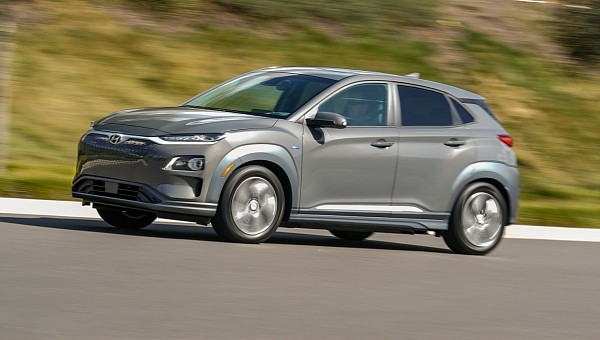Introduced in 2017 for the 2018 model year, the Kona is available with combustion-only powertrains, as a hybrid, and as a zero-emission vehicle. As it happens, the latter is currently subjected to a recall over a condition that may cause a loss of drive power, increasing the risk of an accident.
Last month, Hyundai Motor Corporation became informed Hyundai Motor America of a coolant leak issue involving the electric powertrain control units employed in certain 2021 model year Kona Electric vehicles delivered in the United States. Fast forward to November 18th, and the Data Review Committee escalated the concern to the Technical Review Committee, which decided to perform an analysis of field information.
The North America Safety Decision Authority within Hyundai Motor America convened on December 9th, deciding to conduct a safety recall of just over 850 examples of the 2021 model year Kona Electric. 2021 marks the final year of the pre-facelift Kona Electric in the U.S. of America.
The South Korean automaker is currently aware of three stateside incidents that concluded with a loss of motive power, with receipt dates ranging from January 2021 through July 2021. Thankfully for all parties involved, no crashes or injuries have been reported. The recalled vehicles were produced in the period from June 18th, 2020 to July 31st, 2020.
Supplied by Hyundai Mobis, the electric power control unit assembly – part number 36601-0E170 – may have been produced with insufficient sealing of the DC-DC converter housing. This condition may cause an internal coolant leak, therefore contaminating the main controller. This, in turn, may trigger the limited mobility fail-safe drive mode. The worst-case scenario is a sudden and complete loss of the vehicle’s motive power.
Hyundai explains in documents filed with the National Highway Traffic Safety Administration that said converter housing isn’t properly sealed over inadequate steam cleaning during manufacturing. The driver can identify this condition without cracking open the assembly in two ways: a warning light and/or a message popping up on the instrument cluster.
The recall condition was allegedly fixed in production by the supplier on July 6th, 2020 with the introduction of a revised cleaning process. Converters produced after that date are said to be thoroughly sealed. Affected customers who paid for a replacement EPCU from their pocket are eligible for reimbursement as long as they can present Hyundai Motor America with a receipt or any other proof of payment for the repair.
On February 14th next year, dealers will be informed of the recall condition with instructions to inspect the electric powertrain control unit. In case of any coolant leakage, a replacement is on the menu. Affected owners will be informed of this recall on February 14th, 2023 as well.
Presently listed for the 2023 model year, the Hyundai Kona Electric retails at $35,550 excluding freight and the federal tax credit. 17-inch wheels come standard, along with 201 horsepower channeled to the front wheels and up to 258 miles (415 kilometers) of EPA-rated driving range on the combined cycle. Not long now, the second-gen Kona will replace the first generation, most likely as a 2024 model in the United States market.
The North America Safety Decision Authority within Hyundai Motor America convened on December 9th, deciding to conduct a safety recall of just over 850 examples of the 2021 model year Kona Electric. 2021 marks the final year of the pre-facelift Kona Electric in the U.S. of America.
The South Korean automaker is currently aware of three stateside incidents that concluded with a loss of motive power, with receipt dates ranging from January 2021 through July 2021. Thankfully for all parties involved, no crashes or injuries have been reported. The recalled vehicles were produced in the period from June 18th, 2020 to July 31st, 2020.
Supplied by Hyundai Mobis, the electric power control unit assembly – part number 36601-0E170 – may have been produced with insufficient sealing of the DC-DC converter housing. This condition may cause an internal coolant leak, therefore contaminating the main controller. This, in turn, may trigger the limited mobility fail-safe drive mode. The worst-case scenario is a sudden and complete loss of the vehicle’s motive power.
Hyundai explains in documents filed with the National Highway Traffic Safety Administration that said converter housing isn’t properly sealed over inadequate steam cleaning during manufacturing. The driver can identify this condition without cracking open the assembly in two ways: a warning light and/or a message popping up on the instrument cluster.
The recall condition was allegedly fixed in production by the supplier on July 6th, 2020 with the introduction of a revised cleaning process. Converters produced after that date are said to be thoroughly sealed. Affected customers who paid for a replacement EPCU from their pocket are eligible for reimbursement as long as they can present Hyundai Motor America with a receipt or any other proof of payment for the repair.
On February 14th next year, dealers will be informed of the recall condition with instructions to inspect the electric powertrain control unit. In case of any coolant leakage, a replacement is on the menu. Affected owners will be informed of this recall on February 14th, 2023 as well.
Presently listed for the 2023 model year, the Hyundai Kona Electric retails at $35,550 excluding freight and the federal tax credit. 17-inch wheels come standard, along with 201 horsepower channeled to the front wheels and up to 258 miles (415 kilometers) of EPA-rated driving range on the combined cycle. Not long now, the second-gen Kona will replace the first generation, most likely as a 2024 model in the United States market.



















